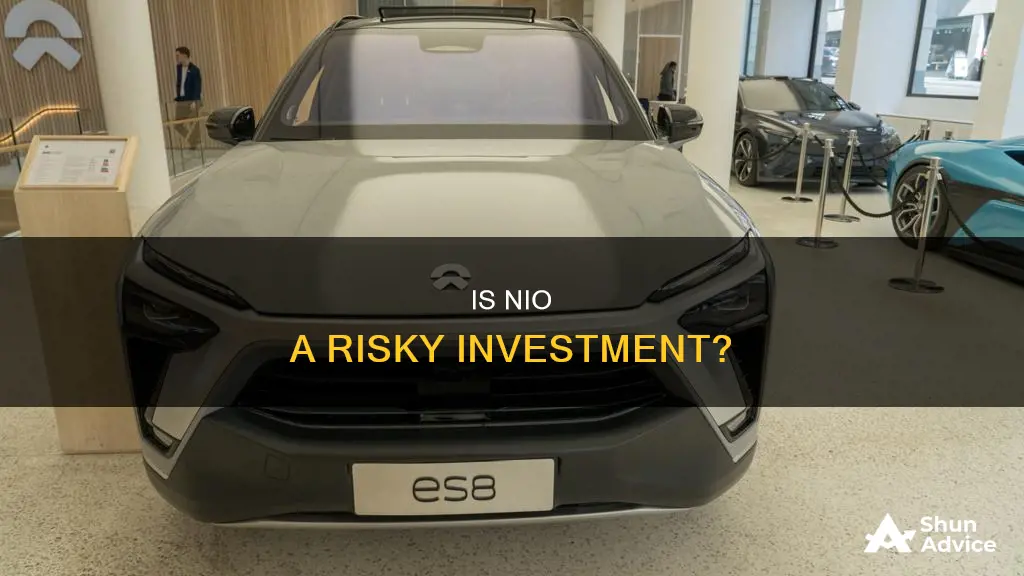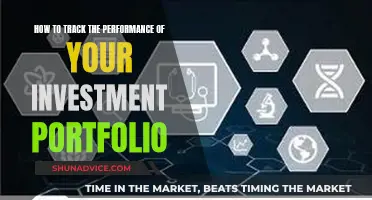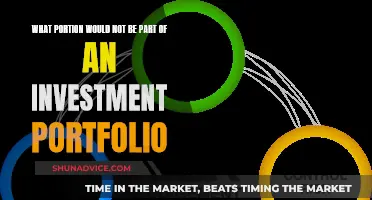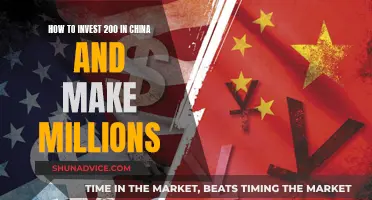
Investing in Nio (NIO) stock is considered risky due to various factors, including the company's financial health, market competition, and geopolitical tensions. NIO is a Chinese electric vehicle (EV) manufacturer that went public in 2018 and has experienced a volatile share price journey since. The company has faced challenges such as high costs, intense competition, supply chain issues, and the impact of the COVID-19 pandemic, which have contributed to an uncertain trajectory. While NIO has innovative offerings like battery-swapping stations, its profitability remains a concern, with analysts forecasting continued losses in the near term. The broader macroeconomic environment, including interest rate hikes and US-China trade tensions, also poses risks for NIO's operations and stock price.
| Characteristics | Values |
|---|---|
| Trajectory | Uncertain with a likely liquidity crunch |
| Stock Performance | Shares have been volatile in 2024, with a 52-week high almost 200% higher than the 52-week low |
| Profitability | Lack of profitability with analysts forecasting losses until 2027 |
| Competition | Failed to live up to the hype and compete with Tesla |
| Earnings Forecast | Analysts have forecasted normalized and GAAP earnings per share (EPS) of -$0.27 for the upcoming quarter |
| Revenue | Revenue estimated at $2.69 billion for the upcoming quarter, only $20 million more than Q3 of 2023 |
| Cash Burn | High cash burn |
| Battery Swapping | The benefit of battery swapping is diminishing with advancements in fast-charging technology |
| Regulatory Environment | Trade tensions between the US and China can significantly affect NIO's operations and stock price |
| Supply Chain Dynamics | Global semiconductor shortages and disruptions can impact production capabilities |
| Economic Conditions | Interest rate hikes, inflation, and economic slowdowns can suppress demand in the EV space |
What You'll Learn

NIO's cash burn and lack of profitability
NIO's cash burn rate is a significant risk factor, as their cash reserves may only last two years at the current rate. While cash losses are expected to decrease over time, profitability remains about three years away, creating uncertainty for investors. NIO's unique battery-swapping program, which allows customers to exchange empty batteries instead of recharging them, has also come under scrutiny. While this was once considered a key differentiator, advancements in fast-charging technology have diminished its relevance, and it is now seen as a potential drag on the company's outlook.
Analysts' forecasts further highlight the challenges NIO faces in achieving profitability. For the upcoming quarter, analysts predict a normalized and GAAP earnings per share (EPS) of -$0.27, indicating ongoing struggles. Moreover, the consensus through to 2026 is for continued losses, with NIO not expected to turn a profit until 2027. This outlook raises questions about the company's ability to navigate its way towards profitability without further capital raises, share dilution, or borrowing.
In summary, NIO's cash burn and lack of profitability are serious concerns for investors. The company's high cash burn rate, coupled with declining revenue and mounting losses, create uncertainty about their financial viability. While advancements in their battery-swapping program initially attracted interest, the waning utility of this program and intense competition in the EV market have further contributed to NIO's challenges in achieving profitability. As a result, investors considering NIO stock are faced with significant risks and uncertainties.
Strategies for Evaluating Your Investment Portfolio
You may want to see also

The waning utility of its battery-swapping program
NIO is a global smart electric vehicle company founded in 2014. The company has been committed to developing charging and swapping technologies and product R&D, and continuously developing its infrastructure network. As of June 2024, NIO has installed 2,432 Power Swap Stations and 22,633 chargers in China, with 804 swap stations and 1,650 superchargers on highways.
NIO's unique selling point is its battery-swapping program, which allows customers to exchange empty batteries instead of recharging them. This was initially deemed a key differentiator and a potential revenue generator. However, with advancements in fast-charging technology, the relevance of battery swapping is diminishing.
While charging an electric vehicle used to take hours, many electric vehicles are now capable of gaining an 80% charge in as little as 10 to 20 minutes using ultra-fast chargers. For example, the Li Mega, a high-end EV, supports 500 kW charging, offering a 10-minute charge to 80%. As charging infrastructure becomes more widespread and faster, consumers may prioritize charging convenience over battery swapping.
NIO has been investing heavily in expanding its network of swapping stations. In June 2024, the company launched its fourth-generation Power Swap Station 4.0, which supports automated battery swaps for multiple brands and different vehicle models. The new station can complete a swap in 144 seconds, 22% faster than its previous generation. However, despite these advancements, the utility of NIO's battery-swapping program is waning due to the rapid progress of charging technology.
In addition to the waning utility of its battery-swapping program, NIO faces other challenges such as cash burn, lack of profitability, and intense competition in the Chinese EV market. These factors contribute to the uncertainty of NIO's trajectory and make it a risky investment option.
Risk-Free Investments: Myth or Reality?
You may want to see also

Nio's poor stock performance compared to the S&P 500
NIO's stock performance has been poor compared to the S&P 500 in the last three years. In 2021, NIO's returns were -35%, followed by a staggering -69% in 2022, and -7% in 2023. In contrast, the S&P 500, a broader market index, has outperformed NIO during this period.
NIO's poor stock performance can be attributed to several factors, including its failure to live up to expectations, challenges in the competitive Chinese EV market, and issues with its unique battery-swapping program. The company has faced setbacks due to China's extended Covid-19 restrictions, causing supply chain disruptions. Additionally, NIO's gross margins have been impacted by intense competition in the market, affecting its profitability.
Another concern for investors is NIO's lack of profitability. Analysts have forecasted normalized and GAAP earnings per share (EPS) of -$0.27 for the upcoming quarter, indicating ongoing struggles to achieve profitability. The company's high cash burn rate and uncertain outlook further contribute to its poor stock performance.
NIO's battery-swapping program, once deemed a key differentiator, is also facing diminishing relevance due to advancements in fast-charging technology. The strategic concern related to the potential obsolescence of battery-swapping technology adds to the unappealing earnings forecast, making NIO a risky investment choice.
While NIO has shown some bullish trends and surges throughout 2024, these are likely driven by technical indicators rather than the company's fundamentals. Overall, NIO appears set to continue posting losses in the foreseeable future, making it a risky investment option.
Understanding Investment Trusts: Attribution Management Explained
You may want to see also

The risks of investing in Chinese stocks
Investing in Chinese stocks comes with a unique set of risks that investors should be aware of before putting their money into the market. Here are some key factors that contribute to the heightened risk associated with Chinese stocks:
- Regulatory and Political Concerns: China has a distinct regulatory and political environment that can significantly impact businesses operating within the country. Investors in Chinese stocks need to be mindful of the potential for sudden policy changes, such as adjustments in subsidies, environmental regulations, trade policies, and foreign investment laws. For example, the trade war between the US and China, along with rising trade barriers in Europe, has negatively affected Chinese companies like Nio.
- Economic Conditions: The Chinese economy is known for its rapid growth, but it also experiences periods of slowdown and uncertainty. Economic downturns, high inflation, and interest rate hikes can impact consumer spending and dampen demand in certain sectors, including the electric vehicle (EV) market.
- Supply Chain Risks: Geopolitical tensions, natural disasters, and pandemics can disrupt supply chains and affect production capabilities. The global semiconductor shortage has impacted the automotive industry, including EV manufacturers like Nio.
- Competition: The Chinese market, especially in the EV sector, is highly competitive, with companies like BYD and Xpeng vying for market share. Nio's battery-swapping program, once a unique selling point, is now facing competition from other automakers, and advancements in fast-charging technology may render it obsolete.
- Accounting Practices and Transparency: Chinese companies have been associated with concerns over accounting fraud and a lack of transparency. This makes it challenging for investors to make fully informed decisions and assess the financial health of these companies.
- Government Influence: The Chinese government wields significant influence over businesses operating within the country. State intervention and the potential for nationalization or sudden regulatory changes can impact the operations and profitability of private companies.
- Currency Risk: Investing in Chinese stocks often involves exposure to the Chinese currency, the Renminbi (RMB). Currency fluctuations can impact the value of investments and the profitability of companies operating in China.
- Geopolitical Tensions: Rising geopolitical tensions between China and other nations, particularly the US, can affect investor sentiment and impact the performance of Chinese stocks.
- Limited Legal Recourse: Investing in Chinese stocks may offer fewer legal protections compared to other markets. The regulatory framework and enforcement of investor rights may differ, and there could be challenges in seeking legal recourse in the event of disputes or fraud.
- Volatility: Chinese stocks tend to be more volatile than those in more mature markets. This volatility can be attributed to various factors, including policy changes, economic fluctuations, and the impact of global events.
It is important for investors to carefully consider these risks and perform thorough due diligence before investing in Chinese stocks. While there may be lucrative opportunities in the Chinese market, particularly in sectors like electric vehicles, the unique challenges faced by companies operating in this environment should not be overlooked.
Recording Unrealized Equity Investment Gains: Strategies and Steps
You may want to see also

The impact of US-China trade tensions on Nio's operations
Nio, the Shanghai-based global electric vehicle (EV) manufacturer, has had to adapt its global strategy due to US-China trade tensions. The company, often described as a key competitor to Tesla, has been affected by the negative consequences of the trade tensions between the two countries, which have resulted in reduced trade and disrupted global supply chains.
In 2024, the Biden administration announced tariffs of 100% on imports of Chinese electric cars, while the European Union also considered similar measures. This was a significant challenge for Nio, as the company had initially focused on the premium end of the market and had started sales in parts of Europe. In response, Nio launched its lower-priced brand, Onvo, with a new L60 SUV that is about $4,000 cheaper than Tesla's Model Y. The company also plans to introduce an even lower-priced entry-level brand called Firefly.
Nio's CEO, William Li, stated that the company would still focus on China but would also seek global expansion by partnering with local distributors or producers in some markets or investing directly in others. This strategy, described as "global capability, local operation," aimed to navigate the geopolitical challenges posed by the US-China trade tensions.
The impact of the trade tensions on Nio's operations was also reflected in its financial performance. In 2023, the company's revenue was $7.8 billion, and the stock price hovered between $7.50 and $10. However, in the first half of 2024, the stock price dipped below $5 as the firm's large debt and high-interest rates, coupled with ongoing political tensions between the US and China, dampened investor sentiment.
The trade tensions have also disrupted Nio's supply chain and production capabilities. The company faced challenges due to global semiconductor shortages and disruptions caused by geopolitical events. These factors impacted Nio's ability to meet delivery targets and maintain stable prices.
Overall, the US-China trade tensions have had a significant impact on Nio's operations, forcing the company to adjust its global strategy, affecting its financial performance and disrupting its supply chain and production processes.
Is Peer-to-Peer Investing a Smart Move?
You may want to see also
Frequently asked questions
NIO stock has underperformed the broader market in recent years. In 2021, 2022, and 2023, NIO's returns were -35%, -69%, and -7% respectively, while the S&P 500's returns were 27%, -19%, and 24%.
There are several risks associated with investing in NIO, including financial and corporate risks, legal and regulatory risks, macro and political risks, and tech and innovation risks. Additionally, NIO faces intense competition in the EV market, supply chain disruptions, and geopolitical tensions between the US and China, which could impact its operations and stock price.
The NIO live share price can be influenced by various sector-specific fundamental events, including financial performance, regulatory changes, supply chain dynamics, competition, and economic conditions.
NIO's battery-swapping program, which allows customers to exchange empty batteries, was once seen as a key differentiator. However, advancements in fast-charging technology have raised questions about the program's relevance. Some investors wonder if battery-swapping will become obsolete, adding to the concerns about NIO's earnings forecast.







